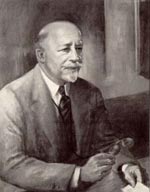William Edward Burghart DuBois

William Edward Burghart DuBois was born in Great Barrington, Massachusetts, an area of very little black discrimination, on February 23, 1868. His mother raised him on her own instilling in him the values of hard work, education and thriftiness. They were poor as compared with other members of the community, but the DuBois family was respected.
William was given great recognition because of his success in school. He did well in high school and was helped to get a scholarship to go to Fisk University. He also attended Harvard University where he recieved his masters degree, a doctorate and a grant to study in Berlin. He worked as a professor in several universities.
Many of DuBois theories were in response to the writings of Booker T. Washington. Washington believed that blacks in America needed pride in themselves in order to rise in a white dominated society. His concern was for solidarity and self-help. DuBois agreed with him in some aspects but had a different prescription for curing the ills of the black community. Washington called for Negroes to give up higher education and politics in order to concentrate on gaining industrial wealth. DuBois disagreed. He belived that only though education could blacks gain status and that Washington's idea promoted black submission to whites.
DuBois' greatest achievements were those of his writings. He wrote many books and essays expressing his beliefs about racial assimilation, cooperation, and the use of education to end prejudice including The Souls of Black Folk and Suppression of the African Slave Trade. The Souls of Black Folk was a very popular analysis of the conflicts blacks were subjected to in society.
Another great achievement was that of the formation of the National Association for the Advancement of Colored People (NAACP) which he founded along with a number of other black and white leaders who shared his beliefs in 1909. He served as director of publicity from 1919-1934. He was also a consultant to the United Nations and edited his magazine, Crisis, from 1910-1932.
DuBois contributed greatly to the education and enlightenment of many people in America though his critics claim that he spoke only to the educated and elite thereby omitting much of the black population from his readers. He eventually became discouraged with the American situation, though, and became a Ghanian citizen in 1963 where he died that same year on August 27.
Autobiography of W.E.B. Dubois :
A Soliloquy on Viewing My Life from the Last Decade of Its First Century
By: W. E. B. Dubois, Herbert Aptheker
Evaluating the Lives and Legacies of Booker T. Washington and W.E.B. DuBois
W(illiam) E(dward) B(urghardt) Du Bois
"Cast Down Your Bucket Where You Are"
Booker T. Washington's Atlanta Compromise Speech
Education 2000 Raceandhistory.com
|